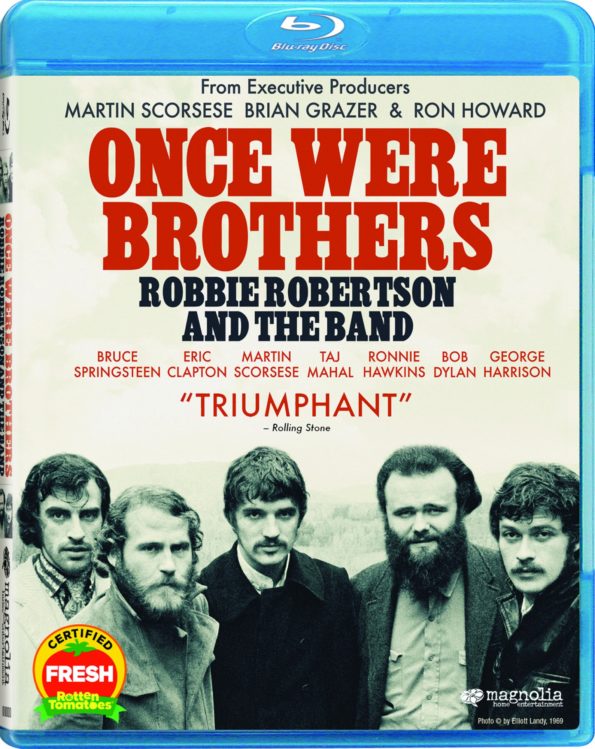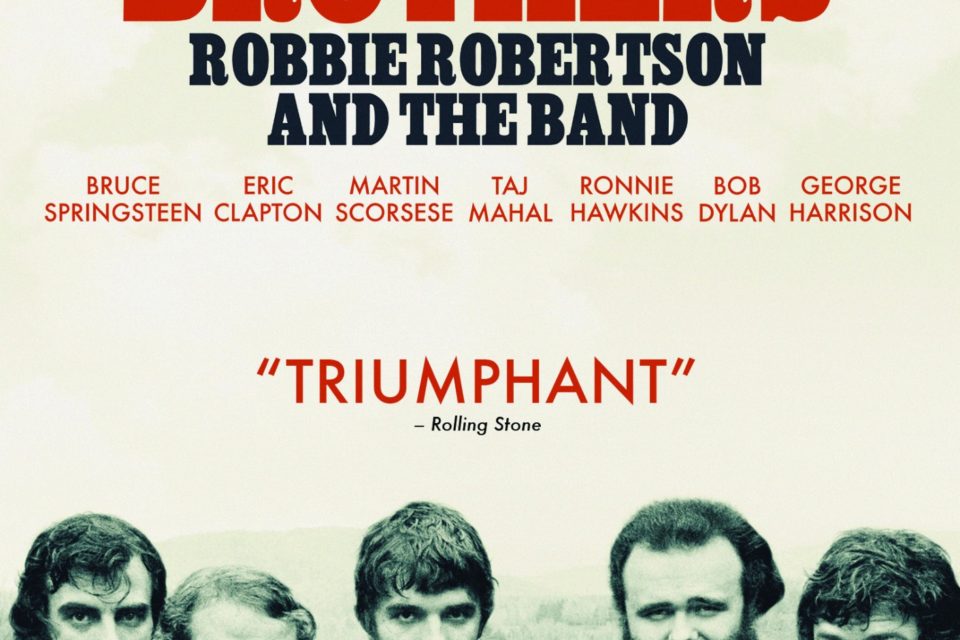Even if you have never been a huge fan, but especially if you are, the story and the impact of The Band and its members remains compelling nearly half-a-century later.
And it’s not because the story of the members of a band in the 1960s-70s making great music over a short period of time but then imploding and breaking up is an unusual story as various members begin drinking, drugging, philandering, becoming egotistical and feuding with each other, and generally maturing and wanting different things creatively and in their lives — in fact that story is practically the norm for bands, even more recently.

Perhaps the most prominent member (but not the primary lead singer), Robbie Robertson, begins the new 1-hour & 40-minute documentary Once Were Brothers: Robbie Robertson and The Band (Magnolia, digital, Blu-ray $17.99 and DVD May 26) by seemingly challenging that reality by saying that he doesn’t know any other group of musicians with a story equivalent to the story of The Band. Well, he’s right in some significant aspects – there are some very unique elements to their collaboration. Despite never being a super-group or having songs as popular as some of the most successful bands of their era (they had some hits that are generally familiar to most people like Up on Cripple Creek, but one of their biggest, The Weight (“Take a load off, Fanny… and you put the load right on me”), peaked at #63, and The Night They Drove Old Dixie Down went to #3 but only when it was recorded by someone else, Joan Baez), The Band was always critically-acclaimed, highly-regarded by their peers, wound up collectively and with some of its members in Halls of Fame and ranked among the most notable bands in history, and the subject of an award-winning 1978 documentary by Martin Scorsese for their reunion concert that was the only way Robertson could get them back together to play again, joined by a megawatt line-up of singers far more popular than they were — Eric Clapton, Bob Dylan, Neil Diamond, Muddy Waters, Ringo Starr, Neil Young, Joni Mitchell, Emmylou Harris, Van Morrison, and many others.
Robertson, who famously had a huge and long-lasting falling out with drummer and lead singer Levon Helm, says the idea of The Last Waltz concert – which takes up about 15-minutes of the film near the end — was to be a springboard for new recordings and concerts by The Band – “That was our dream” — but “everybody just forgot to come back.”
Three of the four other members of The Band are dead now, starting with Richard Manuel at age 42 in 1986, Rick Danko in 1999, and Helm in 2012 (Garth Hudson lives in Woodstock New York, near where The Band famously converted a modest pink house into a recording studio where they all lived and produced their landmark debut album Music from Big Pink), so Robertson’s memories go mostly unchallenged, though director Daniel Roher (Survivors Rowe) does a laudable job of mixing in archival interviews with other members and new interviews with family and associates of The Band.
Scorsese is back as executive producer of Once Were Brothers (the title of a new song by Robertson reflecting on his former collaborators of a few years), along with filmmakers Ron Howard and Brian Grazer.
The story, told by the engaging and even charismatic Roberts in his words to the camera and in voice-over, highlights his childhood in Indian territory Six Nations Reserve near Toronto to which he attributes positively some of his personality traits, beliefs and interest in music at such an early age that he quit school and went to Arkansas and became a song writer and band member at age 15. He and Helm were backups for rockabilly singer Ronnie Hawkins.
He and the other members went off on their own and wrote music that created a new genre inspired by the rockabilly, R&B, and early rock and roll.
Another of the unusual tracks he and his band mates found themselves riding during their early years was as a backup band for Bob Dylan during his concert tour when he was getting booed for moving away from his acoustic folk singer familiarity to introducing an electric rock style. This was apparently one of the early seeds of consternation for Helm, who left the band shortly thereafter before returning for their primary productive years. (The name The Band was derived from how they were referred while with Dylan.)
Among those weighing in through interviews are superstars who were greatly influenced and had huge respect for The Band, including Bruce Springsteen, Eric Clapton, Van Morrison, Taj Mahal, and Ronnie Hawkins, as well as Scorsese.
Those stories, along with background stories by Robertson of the origin of songs such as The Weight, and the stories by members, agents, producers, and Robertson’s wife about the band’s time living together at the pink house when things went from the best times in each of their lives to reckless and acrimonius that are of most interest here, and well told by all involved.
— By Scott Hettrick
